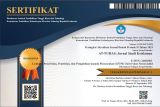A Critique of Misogynistic Hadith Reasoning in the Case of Marital Rape: A Study of Abu Hurairah's Hadith on Prohibition of Wife Refusing Husband's Invitation
(1) * Andre Afrilian
 (UIN Sunan Kalijaga)
(UIN Sunan Kalijaga) Indonesia
(2) Muh. Rizki (Universitas Islam Indonesia)
Indonesia
(*) Corresponding Author
AbstractBiological relations between husband and wife are an obligation and one of the factors of harmony in the household, in Islam it has been regulated in detail about this matter, one of which is regarding the husband's invitation to his wife to have sex has been regulated by naṣ shar'i both in the Qur'an and hadith, in the hadith narrated by Abu Hurairah the prophet once said that the wife who refuses the husband's invitation to have sex will be cursed by the angels. Many internal and external Muslims consider this hadith as a form of misogynistic and marital rape behavior. This paper seeks to address this feminist speculation as a misogynistic hadith. The research method used is descriptive-analytical technique with a normative-sociological approach and library research that examines in more depth the meaning of the naṣ hadith in question from the books of hadith experts as well as the views and ideas of the scholars regarding the hadith through takhrij hadith so that its quality and validity in fiqh are known. The results of this paper cite the view of the hadith scholars, the husband does not have full power over his wife, she can refuse her husband's invitation if she is sick, tired, menstruating and others, and the opposite applies that the husband must fulfill his wife's invitation if there is no urgent reason that allows him to refuse his wife's invitation to have intercourse, because the fulfillment of biological rights in the household is an obligation for both husband and wife. |
Keywords
Full Text: PDF
Refbacks
Copyright (c) 2023 Andre Afrilian
This journal is licensed under a
Creative Commons Attribution-ShareAlike 4.0 International License





.png)






